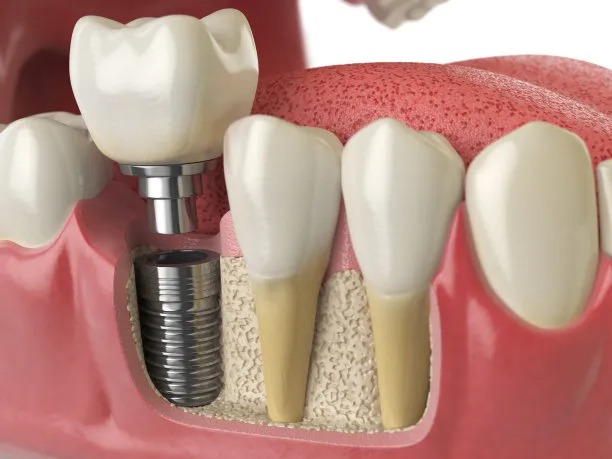Summary: Dental implants have revolutionized the field of dentistry, offering a permanent solution to tooth loss and significantly improving dental aesthetics and functionality. This comprehensive guide explores the benefits of dental implant treatment, including enhanced comfort, increased durability, and support for oral health. Further, it elucidates the processes involved, from initial consultation and planning to the surgical procedure and recovery phase. Whether you are considering implants or curious about the advancements in dental care, this guide provides essential insights into the transformative impact of dental implants for a healthier, more confident smile.
1. Advantages of Dental Implants

One of the most significant advantages of dental implants is their natural appearance. Crafted to resemble your original teeth in shape, size, and color, they blend seamlessly with your existing teeth, ensuring that your smile appears intact. This aesthetic appeal is crucial for those who may feel self-conscious about gaps in their smiles.
Moreover, dental implants contribute to improved oral function. Unlike dentures, which may slip or require periodic adjustments, dental implants offer stability that allows for confident chewing and speaking. This reliability enhances everyday activities without discomfort or concern.
Additionally, dental implants help preserve jawbone density. When a tooth is lost, the underlying bone begins to deteriorate. Implants stimulate the jawbone, preventing bone loss and maintaining facial structure, which contributes to a more youthful appearance over time.
2. Dental Implant Treatment Process Overview
The journey to a healthier smile through dental implants begins with a thorough consultation. During this initial appointment, the dentist will assess your oral health, take necessary imaging, and discuss your medical history. This allows for personalized treatment planning that aligns with your specific needs.
Following the planning phase, the surgical procedure can commence. The implant, a small titanium post, is placed into the jawbone where the missing tooth once was. This step may seem daunting, but most patients report minimal discomfort, and sedation options are available to ensure a seamless experience.
After the placement, a healing period (typically lasting several months) is required for the bone to integrate with the implant fully. This process, known as osseointegration, is crucial for the longevity and stability of the implant. Once healed, a custom crown is placed on the implant, completing the transformation.
3. Recovery and Aftercare for Dental Implants
Post-operative care is essential for the success of dental implants. After the procedure, patients may experience swelling and discomfort, which can be managed with prescribed pain medications and ice packs. Following specific oral hygiene instructions is critical to prevent infections during the healing period.
It is also vital to attend follow-up appointments with your dentist to monitor the healing progress. These check-ups enable the dentist to address any concerns promptly and ensure that the implant is integrating as expected.
Long-term success requires ongoing care, including regular dental check-ups and a thorough oral hygiene regimen. Keeping the area around the implant clean will aid in preventing gum disease, which can compromise the implant’s stability.
4. Cost Considerations and Financial Options
The cost of dental implants can vary widely based on several factors, including the number of implants needed and the complexity of the case. While dental implants may represent a higher initial investment compared to other tooth replacement options, their longevity and durability often make them a more economical choice in the long term.
Many dental insurance plans cover a portion of the implant cost, and understanding your benefits is crucial. Moreover, some dental practices offer financing options to make treatment more accessible. It’s beneficial to explore these avenues to find a solution that fits your budget.
Investing in dental implants is not just a commitment to a better smile; it’s a pledge to improve quality of life through enhanced oral health and function. With the right financial strategy, achieving this goal becomes attainable for many patients.
Summary:
Dental implants offer substantial benefits, including enhanced aesthetics, improved functionality, and jawbone preservation. The treatment involves a well-structured process, from initial consultation through surgical placement and recovery. With proper care, dental implants can lead to lasting results. Overall, they represent a valuable advancement in restorative dentistry.
This article is compiled by Vickong Dental and the content is for reference only.
Vickong Dental
Vickong Dental is a large medical group established in Hong Kong in 2008 by professors from well-known medical universities in Guangdong and Hong Kong, as well as medical doctors from key national '985' universities (including Master's supervisors and senior professors). The chain of branches brings together expert dentists with PhDs and Master's degrees from Hong Kong and Mainland China, committed to providing high-quality dental treatment.
"Vickong Dental Practices the University Motto of 'Healing and Serving Society,' with a Stable Operation for Sixteen Years. It Has Been honored with Hong Kong Enterprise Leaders's Choice,' and is a Global Trusted Implant Center for the Nobel Implant System. Recommended by Hong Kong Metro Broadcast and Guangdong Television, it Serves Customers from Over Thirty Countries and Regions, Gaining the Trust and Favor of Citizens from the Guangdong-Hong Kong-Macau Greater Bay Area and Surrounding Cities.

Thousands of customers' unanimous praise
The most recognized and highly recommended dental service by customers in the Guangdong-Hong Kong-Macau Greater Bay Area
We Ensure You Receive Detailed Care and Attention Here
Hong Kong standards, Shenzhen prices, Your Trusted English-speaking dentists

Vickong Dental Medical-Grade Instrument Disinfection Process
Vickong Dental Medical-Grade Instrument Disinfection Process

Vickong Dental Chain: A Warm and Comfortable Environment for Treatment






Appointment Hours

Q&A
Why choose Vickong Dental?
Vickong Dental practices the university motto 「Medicine to Benefit Society」, with each branch bringing together highly qualified dentists with doctoral and master’s degrees from Hong Kong and the Mainland, and has maintained seventeen years of steady operation。Recipient of 「2024 Hong Kong Enterprise Leaders Brand」, 「2025 Hong Kong Enterprise Leaders Brand」, a Nobel Biocare Global Trusted Implant Center, and a brand recommended by Metro Radio Hong Kong and Guangdong TV。
To date, we have served customers from more than thirty countries and regions,earning exceptionally high word-of-mouth recognition and trusted recommendations from residents across the Guangdong-Hong Kong-Macao Greater Bay Area and surrounding cities
We have eight major branches in Zhuhai、Shenzhen,and a consultation and service assurance center in Hong Kong,so you can book a free consultation at any time for any questions,which is very reassuring.
If I do not accept the quotation after the CT scan, will I be charged??
No! As long as the actual treatment has not started, you will not be charged any fees.
Will there be any additional charges during the treatment process?
No, there won’t be any additional charges. Before treatment begins, we will clearly explain the treatment plan and its corresponding fees. Only after the patient agrees and signs the consent form will we proceed with the dental service.
Can I pay in Hong Kong dollars?
Yes. Vickong Dental accepts payment in Hong Kong dollars. The amount will be converted based on the exchange rate of the day, and the applicable rate will be clearly communicated to you in advance.
Can I reschedule my appointment at any time?
Yes. Please contact us via **WeChat** or **WhatsApp** as early as possible, providing your original appointment time and details, along with your preferred new date and time slot for rescheduling.













